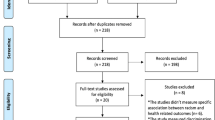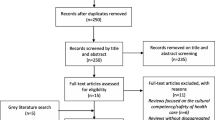Abstract
The amount of research concerned with the values of health professionals (HPs) is steadily growing. Around the world HPs face similar challenges when patients express their existential and spiritual views. How HPs engage these views, and the degree of embedment into consultations, differ across cultures. Today, more than ever before, researchers in this field need to share experiences and build new knowledge upon local findings. To meet this demand, we founded the international collaboration “Network for Research on Spirituality and Health” (https://NERSH.org). One of the central projects of our network has been to build a large international data pool of health professionals’ attitudes toward religiosity and spirituality. Today the data pool hosts answers from more than 6,000 health professionals from 17 separate surveys derived from 12 countries. Data were gathered by either the questionnaire “Religion and Spirituality in Medicine, Perspectives of Physicians” (RSMPP) or its successor ‘NERSH Questionnaire’. In this article we describe the methodology behind the construction of the data pool. We also present an overview of five available scales related to HP religiosity and spirituality, including a description of scale reliability and dimensionality.

Similar content being viewed by others
References
Al-Yousefi, N. A. (2012). Observations of muslim physicians regarding the influence of religion on health and their clinical approach. Journal of Religion and Health, 51(2), 269–280.
Büssing, A., Fischer, J., Haller, A., Heusser, P., Ostermann, T., & Matthiessen, P. (2009). Validation of the brief multidimensional life satisfaction scale in patients with chronic diseases. European Journal of Medical Research., 14(4), 171.
Büssing, A., Ostermann, T., Matthiessen, P.F. (2007). Distinct expressions of vital spirituality" The ASP Questionnaire as an Explorative Research Tool". Journal of Religion and Health,pp. 267–286.
Büssing, A., & Koenig, H. G. (2008). The Benefit through spirituality/religiosity scale—a 6-item Measure for Use in Health Outcome Studies. The International Journal of Psychiatry in Medicine., 38(4), 493–506.
Butcher, W. (2013). Spirituality, religion and psychiatric practice in New Zealand: a survey of psychiatrists in New Zealand. Monography.
Butcher, W. (2015). Spirituality, religion and psychiatric practice in New Zealand: an exploratory study of New Zealand Psychiatrists. Health and Social Care Chaplaincy., 3(2), 176–190.
Cronbach, L.J. (1951) Coefficient alpha and the internal structure of tests. Psychometrika, 16, (3):297–334.
Curlin, F.A., Moschovis, P.P. (2004). Is religious devotion relevant to the doctor-patient relationship? Journal of Family Practice, 53(8):632–636.
Curlin, F.A., Lantos, J.D., Roach, C.J., Sellergren, S.A., Chin, M.H. (2005) Religious characteristics of U.S. physicians: a national survey. Journal of General and Internal Medicine, 20,(7):629–634.
Curlin, F. A., Chin, M. H., Sellergren, S. A., Roach, C. J., & Lantos, J. D. (2006). The Association of Physicians' religious characteristics with their attitudes and self-reported behaviors regarding religion and spirituality in the clinical encounter. Medical Care, 44(5), 446–453.
Curlin, F. A., Dugdale, L. S., Lantos, J. D., & Chin, M. H. (2007a). Do religious physicians disproportionately care for the underserved? Annals of Family Medicine, 5(4), 353–360.
Curlin, F. A., Lawrence, R. E., Chin, M. H., & Lantos, J. D. (2007b). Religion, conscience, and controversial clinical practices. New England Journal of Medicine, 356(6), 593–600.
Curlin, F. A., Lawrence, R. E., Odell, S., Chin, M. H., Lantos, J. D., Koenig, H. G., et al. (2007c). Religion, spirituality, and medicine: psychiatrists' and other physicians' differing observations, interpretations, and clinical approaches. American Journal of Psychiatry, 164(12), 1825–1831.
Curlin, F.A., Odell, S.V., Lawrence, R.E., Chin, M.H., Lantos, J.D., Meador, K.G., et al. (2007d). The relationship between psychiatry and religion among U.S. physicians. Psychiatric Services, 58(9):1193–1198.
Curlin, F. A., Sellergren, S. A., Lantos, J. D., & Chin, M. H. (2007e). Physicians' observations and interpretations of the influence of religion and spirituality on health. Archive Internal Medicine, 167(7), 649–654.
Curlin, F. A., Nwodim, C., Vance, J. L., Chin, M. H., & Lantos, J. D. (2008). To die, to sleep: US physicians' religious and other objections to physician-assisted suicide, terminal sedation, and withdrawal of life support. American Journal of Hospice and Palliative Care, 25(2), 112–120.
Hvidt, N. C., Kørup, A. K., Curlin, F. A., Baumann, K., Frick, E., Søndergaard, J., et al. (2016a). The NERSH International Collaboration on values, spirituality and religion in medicine: development of questionnaire, description of data pool, and overview of pool publications. Religions, 7(8), 107.
Hvidt, N.C.M., Mayr, B., Paal, P., Frick, E., Forsberg, A., Büssing, A. (2016b). For and against organ donation and transplantation: intricate facilitators and barriers in organ donation perceived by German nurses and doctors. Journal of Transplant.
Koenig, H. G., & Büssing, A. (2010). The Duke University Religion Index (DUREL): a five-item measure for use in epidemological studies. Religions., 1(1), 78–85.
Kørup, A. K., Nielsen, C. T., Søndergaard, J., Alyousefi, N. A., Lucchetti, G., Baumann, K., et al. (2017).The International NERSH Data Pool—a methodological description of a data pool of religious and spiritual values of health professionals from six continents. Religions, 8(2), 24.
Kuseyri, C. (2017). Spiritualität und Religiosität unter dem türkischstämmigen Medizinpersonal in Deutschland. Dr.Med. Ludwig Maximilian University 2014–2016.
Lee, E., & Baumann, K. (2013). German Psychiatrists' Observation and Interpretation of Religiosity/Spirituality. Evidence Based Complementary and Alternative Medicine, 2013, 8.
Lee, E., & Baumann, K. (2019). Religiosity and spirituality: is it an appropriate issue in psychiatry and psychotherapy?—comparative studies of Germany and South Korea. Open Journal of Social Sciences., 7, 300–310.
Lee, E., Zahn, A., & Baumann, K. (2011). "Religion in Psychiatry and Psychotherapy?" A pilot study: the meaning of religiosity/spirituality from staff's perspective in psychiatry and psychotherapy. Religions, 2(4), 525–535.
Lucchetti, G., Ramakrishnan, P., Karimah, A., Oliveira, G. R., Dias, A., Rane, A., et al. (2016). Spirituality, religiosity, and health: a comparison of physicians' attitudes in Brazil, India, and Indonesia. International Journal of Behaviour Medicine, 23(1), 63–70.
Münger, R. (2017). Religious Characteristics of Family Physicians and their Perception of religious and spiritual Issues in the Doctor-Patient Relationship. Bern, Germany: University of Berne.
Ramakrishnan, P., Karimah, A., Kuntaman, K., Shukla, A., Ansari, B.K., Rao, P.H., et al. (2014a). Religious/spiritual characteristics of Indian and Indonesian physicians and their acceptance of spirituality in health care: a cross-cultural comparison. Journal of Religion and Health,, pp 649–669.
Ramakrishnan, P., Dias, A., Rane, A., Shukla, A., Lakshmi, S., Ansari, B. K. M., et al. (2014b). Perspectives of Indian traditional and allopathic professionals on religion/spirituality and its role in medicine: basis for developing an integrative medicine program. Journal of Religion and Health, 53(4), 1161–1175.
Ramakrishnan, P., Rane, A., Dias, A., Bhat, J., Shukla, A., Lakshmi, S., et al. (2014c). Indian health care professionals' attitude towards spiritual healing and its role in alleviating stigma of psychiatric services. Journal of Religion and Health,. pp 800–1814.
Saffari, M., Zeidi, I. M., Pakpour, A. H., & Koenig, H. G. (2013). Psychometric properties of the Persian version of the Duke University Religion Index (DUREL): a study on Muslims. Journal of Religion and Health, 52(2), 631–641.
Sijtsma, K. (2009). On the use, the misuse, and the very limited usefulness of Cronbach’s alpha. Psychometrika, 74(1), 107–120.
Tomasso, C. D., Beltrame, I. L., & Lucchetti, G. (2011). Knowledge and attitudes of nursing professors and students concerning the interface between spirituality, religiosity and health. Revista Latino Am Enfermagem, 19(5), 1205–1213.
van Randwijk, C.B., Opsahl, T., Hvidt, E.A., Kørup, A.K., Bjerrum, L., Thomsen, K.F., et al. (2018). Characteristics of religious and spiritual beliefs of Danish physicians: and likelihood of addressing religious and spiritual issues with patients. Journal of Religion and Health.
Acknowledgments
The authors wish to thank Farr A. Curlin for his work within this field of research and not least for the development of the RSMPP upon which the NERSH data pool rests. Also, Curlin contributed with the American dataset included in data pool. Several NERSH collaborators have contributed to the NERSH data pool with local samples for which we are very grateful: Andreas Schulze, Inga Wermuth, Christian Balslev van Randwijk, Can Kuseyri, and Tryphon Mukwayakala. We also wish to acknowledge head of the Research Department of General Practice, Odense, Denmark, Jesper Nielsen, and Jens Søndergaard for hosting the NERSH data pool and facilitating research in this field.
Author information
Authors and Affiliations
Contributions
Alex Kappel Kørup wrote the article, conceived, designed, and performed the synchronization of the local data collections and conducted statistical analysis including reliability tests and factor analysis. Jens Søndergaard hosts the NERSH-database, contributed to research oversight, and contributed to critical manuscript revision. Nada A. AlYousefi conceived, designed, performed the survey in Saudi Arabian, and contributed to critical manuscript revision. Giancarlo Lucchetti conceived, designed, and performed the Brazilian surveys (physicians, medical residents and nurses) and contributed to critical manuscript revision. Klaus Baumann conceived, designed, performed a German survey in Freiburg, was co-founder of the NERSH-Network, and contributed to critical manuscript revision. With Klaus Baumann, Eunmi Lee conceived, designed, and performed a German survey in Freiburg and South Korea, and contributed to critical manuscript revision. Azimatul Karimah conceived, designed, performed the Indonesian survey and contributed to critical manuscript revision. Parameshwaran Ramakrishnan conceived, designed, and performed the Indian survey and contributed to critical manuscript revision; Eckhard Frick, co-founded the NERSH-Network, conceived, designed, performed a local survey as well as contributed to critical manuscript revision. Arndt Büssing co-founded of the NERSH-Network, contributed to critical manuscript revision, and performed reliability analyses in the first evaluation round. René Hefti conceived, designed and performed the Swiss survey, and contributed to critical manuscript revision. Wyatt Butcher conceived, designed and performed the New Zealand survey, and contributed to critical manuscript revision. Niels Christian Hvidt is responsible for project conception, is a co-founder and coordinator of the NERSH-Network, and contributed to critical manuscript revision.
Corresponding author
Ethics declarations
Conflicts of interest
The authors declare no conflict of interest.
Additional information
Publisher's Note
Springer Nature remains neutral with regard to jurisdictional claims in published maps and institutional affiliations.
Electronic supplementary material
Below is the link to the electronic supplementary material.
Rights and permissions
About this article
Cite this article
Kørup, A.K., Søndergaard, J., Alyousefi, N.A. et al. The International NERSH Data Pool of Health Professionals’ Attitudes Toward Religiosity and Spirituality in 12 Countries. J Relig Health 60, 596–619 (2021). https://doi.org/10.1007/s10943-020-01077-6
Published:
Issue Date:
DOI: https://doi.org/10.1007/s10943-020-01077-6




